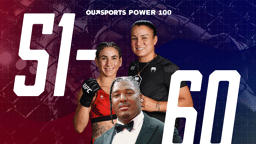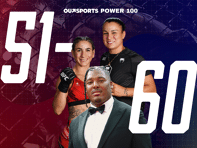In commemoration of Pride Month and the 50th year since the Stonewall Inn riots in New York, Outsports is profiling one out athlete daily who embodies the “Stonewall Spirit,” reflecting the courage of those who launched the modern LGBTQ rights movement.
Robbie Rogers… Jason Collins… Michael Sam. These are some of the most prominent names in the timeline of professional athletes coming out as active players. And Andrew Goldstein beat all of them to the punch.
Goldstein emerged as the first openly gay American male professional team-sport athlete in 2005 when he was drafted by his hometown Boston Cannons in Major League Lacrosse. He then moved on to the Long Island Lizards, playing goaltender through 2006.
Even before breaking barriers on the professional level, Goldstein shattered the stereotype of the testosterone-fueled lacrosse bro by coming out to his teammates and competing as an openly gay athlete at Dartmouth College in 2003.
To get a sense of the kind of courage it required for Goldstein to take this step, remember that this was a country where 11 states would soon pass marriage equality bans in the 2004 election. Acceptance from his teammates was far from a sure thing.
As Goldstein later told ESPN’s SportsCenter…
“I never once imagined that I would be an openly gay person, that that would be my life. I always imagined that lies and hiding would be a large part of getting through the day. There are so many sleepless nights. There are moments when you don’t want to be alive.”
Instead of letting fear and hiding define his life, Goldstein took control and asserted who he was. Already established as a vital part of the Dartmouth lacrosse team, his teammates stepped up and embraced him for doing so, with several immediately apologizing for using “gay” as a pejorative in the locker room.
The highlight of Goldstein’s college career was a goal against Syracuse in the 2003 NCAA playoffs that made him the first goaltender to score in the tourney in 30 years. As Goldstein later wrote, “I guess it takes a gay goalie to have enough balls to score in the NCAA Tournament.”
Two months after that reputation-making moment, Goldstein started the coming out process by telling one of his teammates that he was gay. Ten years after this momentous time, he reflected:
“I’m sure scoring the goal helped me have the confidence to come out, just as having a boyfriend for the first time gave me the confidence to score the goal. It was a pretty unbelievable time for someone who had always wanted to be great at sports and had been holding a secret inside for a decade.”
In addition to his history making accomplishments, Goldstein received a number of awards throughout his career. A two time All-American at Dartmouth, he was later named to the OUT 100 in 2006, earned a GLAAD Media Award for his ESPN feature, and was among the first inductees to the National Gay and Lesbian Sports Hall of Fame.
But Goldstein’s mark on the sporting world didn’t end with his professional career. After establishing a successful career as a doctor and medical researcher in Los Angeles, Goldstein was contacted by the father of a twelve year old gay lacrosse player named Braeden Lange who was dealing with severe bullying shortly after coming out himself.
In response, Goldstein and some of his lacrosse colleagues put together a series of supportive videos to let Lange know that he was not alone. He then helped organize The Courage Game, a lacrosse exhibition to support gay youth in partnership with the You Can Play Project.
Lange later admitted to ESPN, “If Andrew hadn’t come, then I probably wouldn’t have made it.” His father Scott added, “Unequivocally, yes. Andrew saved Braeden’s life.” Most athletes have difficulty adjusting to life after leaving their sport. But for Andrew Goldstein, that’s when his real heroism had just begun.
Our “Stonewall Spirit” series continues tomorrow and every day during Pride.





































